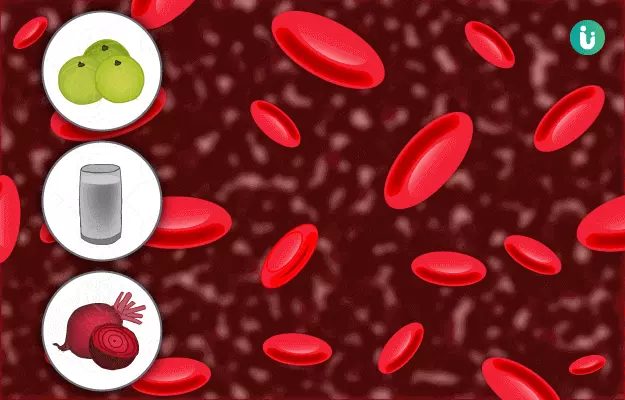Circulating blood has several types of cells including red blood cells (RBCs), white blood cells (WBCs) and platelets, each having different functions. Platelets are tiny blood cells, having a specific role in clot formation. This helps in stopping bleeding at a wound site. So, maintaining a normal platelet count is very important for your body functions.
But, there are certain conditions that are known to reduce your platelet count, like dengue fever, certain infectious states and chemotherapy drugs used for the treatment of cancer. It is even more essential for these individuals to maintain an optimal platelet count.
(Read more: Platelet count test)
Some foods like papaya and amla, to name the best, have a platelet increasing action, and supplementing these in your diet will be helpful. This article discusses each of these foods in detail.
Platelets
Platelets, as already mentioned, have a role in the formation of blood clot, which is essential to cease bleeding, whether that originating from a minor cut or a deep-seated injury.
When blood vessels are damaged, they send out signals in the body, which are perceived by the platelets. They then rush to the site of injury and begin their haemostatic (stopping of bleeding) actions. Platelets also assist in the process of normal healing of the wound.
Without the action of these cells, even a minor wound or cut would result in incessant bleeding or haemorrhage.
Platelet count
The normal platelet count is 1,50,000 to 4,50,000 per microlitre of blood. Below this, there is a risk of heavy bleeding in individuals, which is particularly high in case the blood platelet level falls below 50,000.
A low platelet count can be ascertained to two basic causes. It is because either the formation of platelets in the body is too low, or these cells have been destroyed in the spleen, liver or directly in the bloodstream.
The destruction of platelets is known as thrombocytopenia and can be caused due to several conditions like medications, infections, pregnancy, abnormal immune response, cancer, kidney diseases, or an enlarged spleen, which is involved in the destruction.
Thrombocytopenia is marked by symptoms, such as excessive bleeding due to lack of clot formation. This bleeding could either surface on the skin or could be in the form of haemorrhage or internal bleeding, which is a more serious risk. Nose bleeding, gum bleeding or haematuria (blood with urine) are also commonly observed in this condition.
Foods to increase platelet count
Food is an important aspect when desiring to naturally increase blood platelet levels. Certain food products are involved in the synthesis of platelets, and increasing the dosage of these may prove to be helpful.
Dengue, which is a condition commonly associated with low platelet levels, is often manageable with papaya leaf extracts. There are numerous other foods, which can be supplemented in your diet to achieve similar actions. Such foods and their benefits have been discussed below.
But first, you should note that it is mandatory to consult with your doctor if you suffer from any condition or observe symptoms like excessive bleeding, bruising or petechiae (red or purple spots on the skin caused due to vessel injury), before indulging in these remedies.
Papaya to increase platelets
When thinking of boosting platelet levels naturally, papaya is the first food that comes to mind. Papaya has natural blood clotting properties and the ability to boost platelet levels. It can be eaten raw or in the form of juice.
One specific part of papaya possessing platelet enhancing properties is its leaf. You can make juice from papaya leaf extract to reap the maximum benefits of the fruit. Although it may taste slightly bitter and unpleasant, it will surely help in achieving the desired results.
A recent study found that papaya leaf extracts have an important role in increasing the level of platelet and even RBCs. The study suggested the role of a certain chemical in papaya leaves in boosting the process of thrombopoiesis (formation of platelets).
Further studies are required to identify and test this chemical compound, so, it can be used in the medicinal treatment of thrombocytopenia. Until then, having a glass of juice derived from papaya leaf extract or taking its supplement may suffice.
Vitamin C rich foods to increase platelets
A deficiency of vitamin C is commonly associated with an increased bleeding tendency, bleeding of the gums, bruising and development of petechiae, along with a reduced immune response. While these symptoms are mainly due to abnormal collagen production, platelet activity is also affected by a deficiency of this vitamin. Vitamin C helps in improving platelet count by improving the immune functioning of the body, which may be reduced in states of cancer or chemotherapy, further decreasing the platelet count.
A clinical study found that a deficiency of vitamin C is associated with a risk of thrombocytopenia. So, supplementing your diet with Vitamin C rich foods, like guava, orange, lemon, kiwi, potato, broccoli, etc may prove to be beneficial.
Another study suggested that oral supplementation with vitamin C is likely to increase platelet production. But, it is recommended to increase the intake of natural sources of the vitamin for the best results. This is because long-term use of vitamin C supplements can have serious side effects.
Amla to boost platelet count
Amla or the Indian gooseberry is very helpful in increasing blood platelet levels. This property can be attributed to amla being a rich natural source of vitamin C. To achieve thrombopoietic actions with the help of amla, it is recommended to consume 3 to 4 gooseberries on an empty stomach each morning. You can also make an amla jam or murabba to be eaten for these benefits. Combining it with some other purifying agent like aloe vera will further help in increasing these actions.
(Read more: Amla murabba benefits)
Vitamin B12 to improve platelet count
Vitamin B12, present in a variety of plant and animal foods like, eggs, meat, lean chicken, fishes, pulses and green leafy vegetables, is essential for the synthesis of platelets.
A deficiency of vitamin B12 is associated with a lower red cell distribution width platelet ratio, also called RPR. RPR is reflective of the chronicity of diseases associated with lower platelet levels and helps in determining the mortality of individuals affected by these diseases. RPR is a significant marker of these diseases.
It has been evidenced that supplementation with vitamin B12 helps in improving the RPR ratio. This ensures an optimal number of functioning platelets in your body and in addition, helps in protecting you against the chronic state associated with this state. Vitamin B12 helps in improving platelet dysfunction by altering the size of platelets formed during this stage.
Folic acid to increase platelet levels
Vitamin B9 or folate or folic acid is a water-soluble vitamin, which means that it cannot be stored by the body and is essential to be consumed by the diet. It is a constituent of vitamin B complex and is found in a variety of foods like green leafy vegetables- spinach, broccoli, kale; legumes, eggs, asparagus, to name a few sources. Folic acid is actively involved in the process of cell division and growth of blood cells, and its deficiency has been associated with thrombocytopenia.
Researchers have demonstrated that 64% of the patients receiving high dose folate responded with an improvement with platelet count either completely or for a notable period of time.
However, sufficient care must be taken during supplementation because high doses can cause serious side effects which include anaemia or cognitive impairment of the individual taking supplements.
Vitamin E to improve platelet count
Vitamin E is a powerful antioxidant, which is highly effective against oxidative damage caused to body cells. This is enabled by its inhibitory actions on the activity of free radicals.
Studies have found that oxidative stress has a significant role in the pathogenesis of acute and chronic ITP (or idiopathic thrombocytopenic purpura). ITP is marked by a diminished level of platelets leading to excessive bleeding, bruising and other related symptoms.
It occurs due to body’s immune response acting against its own platelets. Supplementation with vitamin E will help to reduce oxidative stress, which is responsible for a condition as such. This may lead to an improvement in the number of platelets due to modification of the immune response.
So, you can include vitamin E rich sources like eggs, sunflower oil, nuts like almonds, hazelnuts etc in your diet.
(Read more: Vitamin E deficiency symptoms)
Vitamin D for increasing platelets
Vitamin D, the natural source of which is sunlight, is also present in certain food items, particularly milk and its products. Research has suggested that vitamin D is involved in the production of blood cells, including platelets. Moreover, a deficiency of vitamin D is associated with the occurrence of autoimmune diseases.
Idiopathic thrombocytopenic purpura has been recognised to be an autoimmune disorder, which is responsible for a reduction in platelet count. So, supplementation with vitamin D or sufficient exposure to sunlight may prove to be beneficial.
Fresh foods to increase platelet count
Since the role of several food items has been recognised to cater to an improvement in blood platelet levels, it is best to have a multitude of several food products. The role of vitamins (vitamin B12, B9, C and D) has been specifically recognised in this process. Including fresh foods like leafy greens, legumes, pulses and animal products like eggs, meats, chicken, etc. has been recommended. Specific inclusion of food sources like papaya leaf extract, amla juice is advisable.
Another food with high platelet boosting effects is beetroot. Beetroot juice, when taken in sufficient amounts, can boost platelet levels in a very short time span. Combining beetroot juice with carrot juice has been suggested to improve platelet levels in 3-4 days. Other than this, tomato juice, spinach leaves and whole grains have been found to be beneficial in this regard. The role of nuts, which are rich sources of vitamin E has also been established.
It has also been suggested that red foods like beetroot juice, tomato, carrot, berries, watermelon and cherries help in improving platelet counts. So, increasing these foods may prove to be beneficial. Having a balanced diet including all the dietary components and careful inclusion of these special foods is highly recommended.
How to increase platelet count
Appropriate foods are clearly the key to improving your platelet count and function. But, along with improving your diet, it is essential that you take care of the following few points:
- Avoid alcohol- Alcohol slows the production of platelets. A significant reduction in platelet counts is observed in case of heavy drinkers. So, it is best to avoid alcohol to improve platelet counts.
- Avoid harmful chemicals- Contact with harmful chemicals and pollutants slow the production of platelets.
- Medicines- Certain medications like chloramphenicol or diuretics reduce platelet levels. It is best to consult with your doctor about these medications and opt for a substitute, whenever possible.
- If immunosuppression due to cancer or chemotherapy drugs is the cause of low platelets, it is recommended to include more fresh fruits and vegetables to boost antioxidant and immune function.
- Vaccination is another way to improve platelet levels since certain infections are associated with reduced platelet. Vaccination for measles, rubella, mumps and chickenpox is recommended at the right age.
- Regular, moderate exercise may also be beneficial in improving platelet function, but, it is important to not indulge in any physical activities if the platelet count is too low (below 15000).
- Other than this, it is important to be vigilant to avoid accidental cuts, injuries and bruises since this would lead to excessive bleeding, which will further diminish your platelet counts.
Find Hematologist in cities
Doctors for Normal platelet count and how to increase it

Dr. Srikanth M
Hematology
25 Years of Experience

Dr. Kartik Purohit
Hematology
13 Years of Experience
References
- National Cancer Institute [Internet]. Bethesda (MD): U.S. Department of Health and Human Services; NCI Dictionary of Cancer Terms
- University of Rochester Medical Center Rochester, NY. [Internet] What Are Platelets?
- Sinhalagoda Lekamlage Chandi Asoka Dharmarathna et al. Does Carica papaya leaf-extract increase the platelet count? An experimental study in a murine model . Asian Pac J Trop Biomed. 2013 Sep; 3(9): 720–724. PMID: 23998013
- Ian Mark Fraser, Mark Dean. Extensive bruising secondary to vitamin C deficiency . BMJ Case Rep. 2009; 2009: bcr08.2008.0750. PMID: 21686649
- Bassem M Mohammed et al. Impact of high dose vitamin C on platelet function . World J Crit Care Med. 2017 Feb 4; 6(1): 37–47. PMID: 28224106
- Ingeberg S, Stoffersen E. Platelet dysfunction in patients with vitamin B12 deficiency. Acta Haematol. 1979;61(2):75-9. PMID: 105547
- Platelet Disorder Support Association. Vitamins and Other Supplements. Cleveland, Ohio [Internet]
- American Society of Hematology. The role of vanin-1 and oxidative stress-related pathways in distinguishing acute and chronic pediatric ITP. Washington, DC













